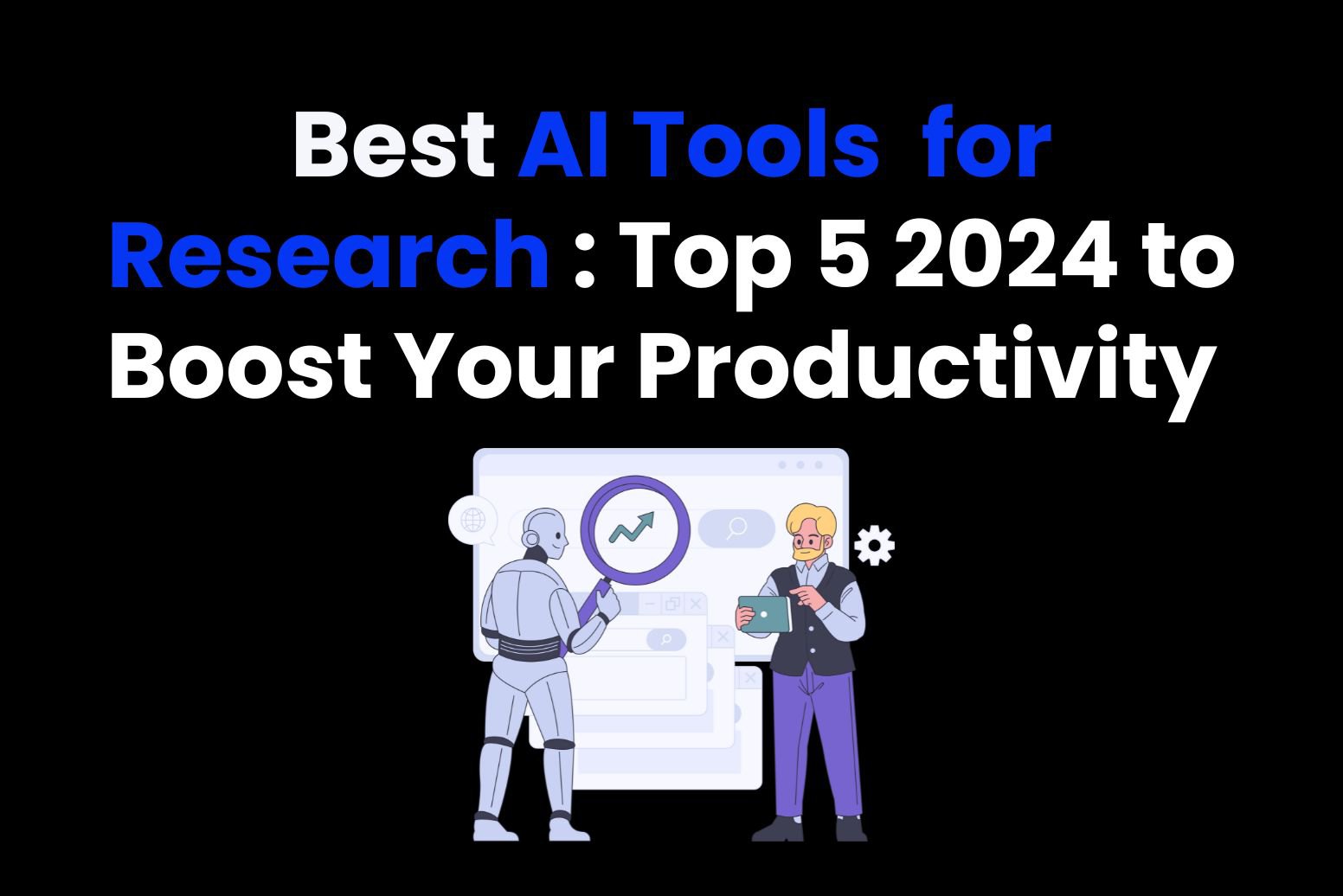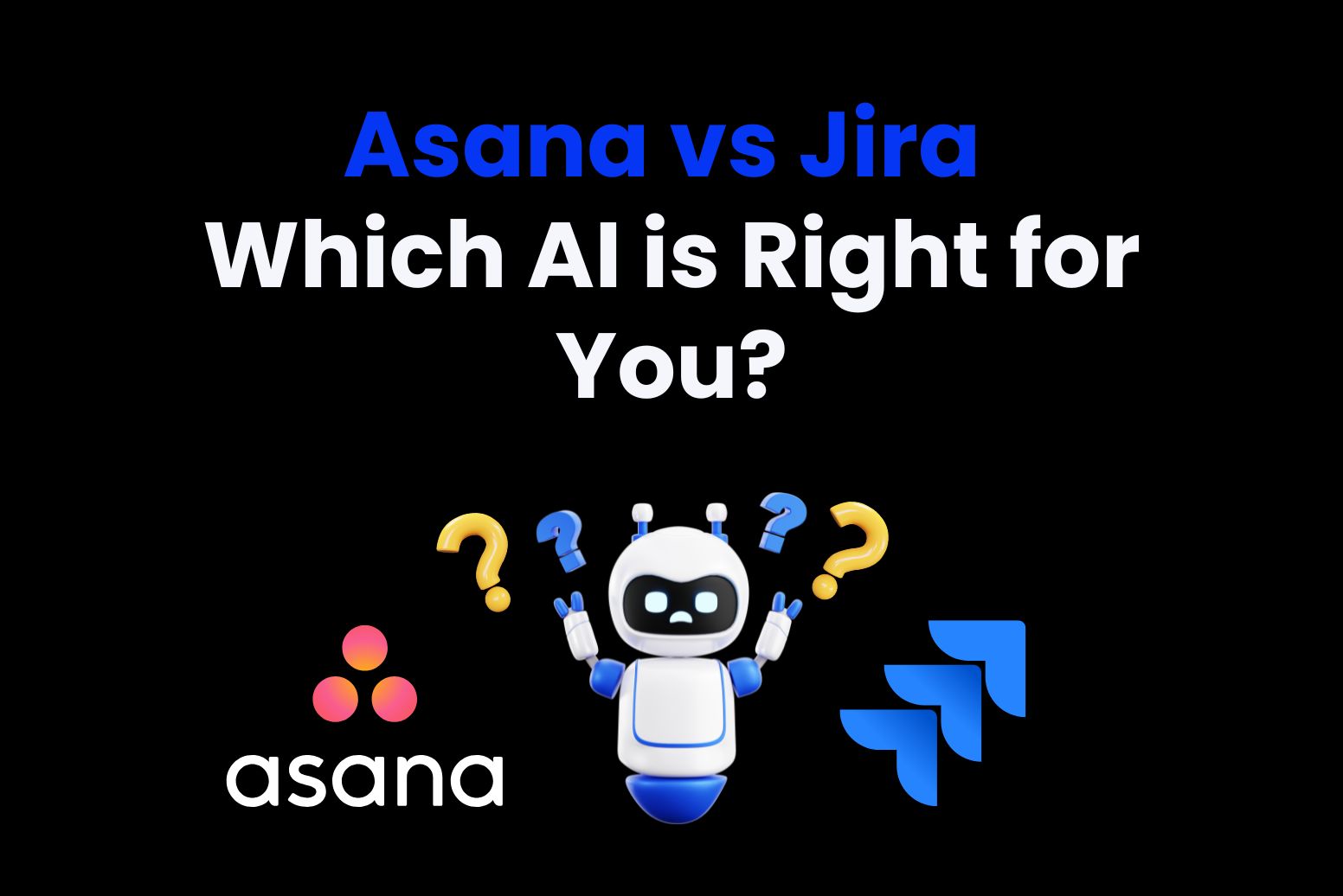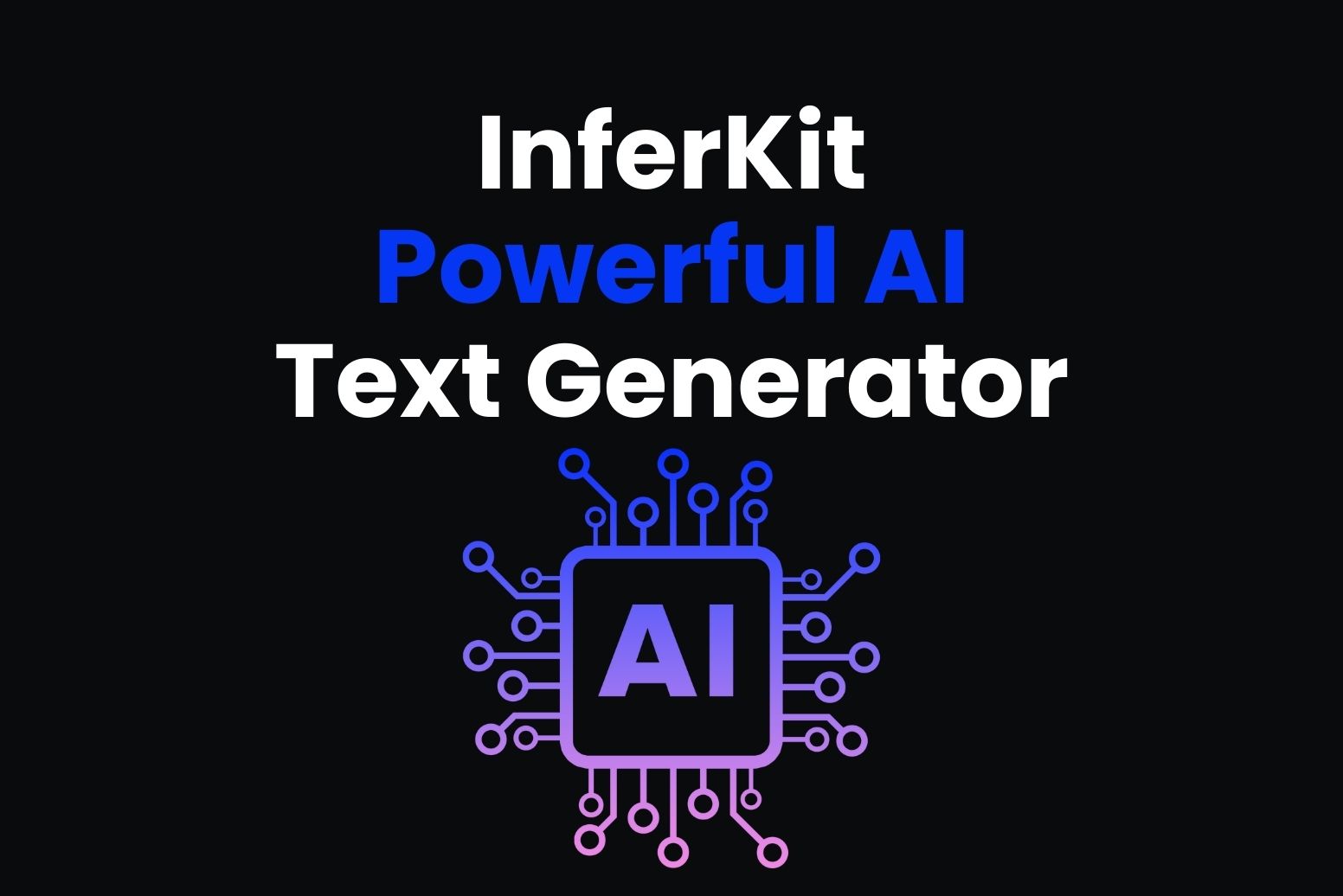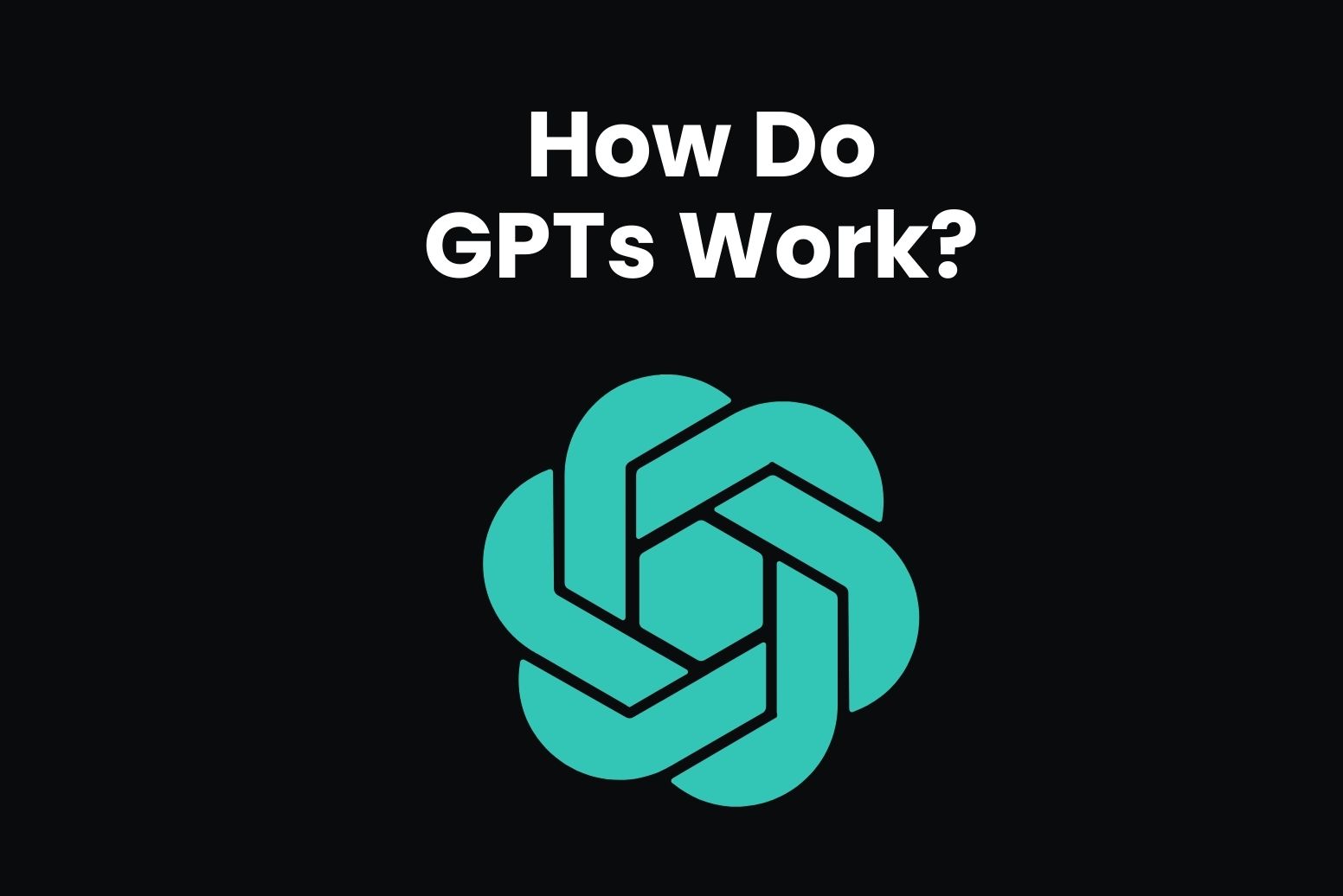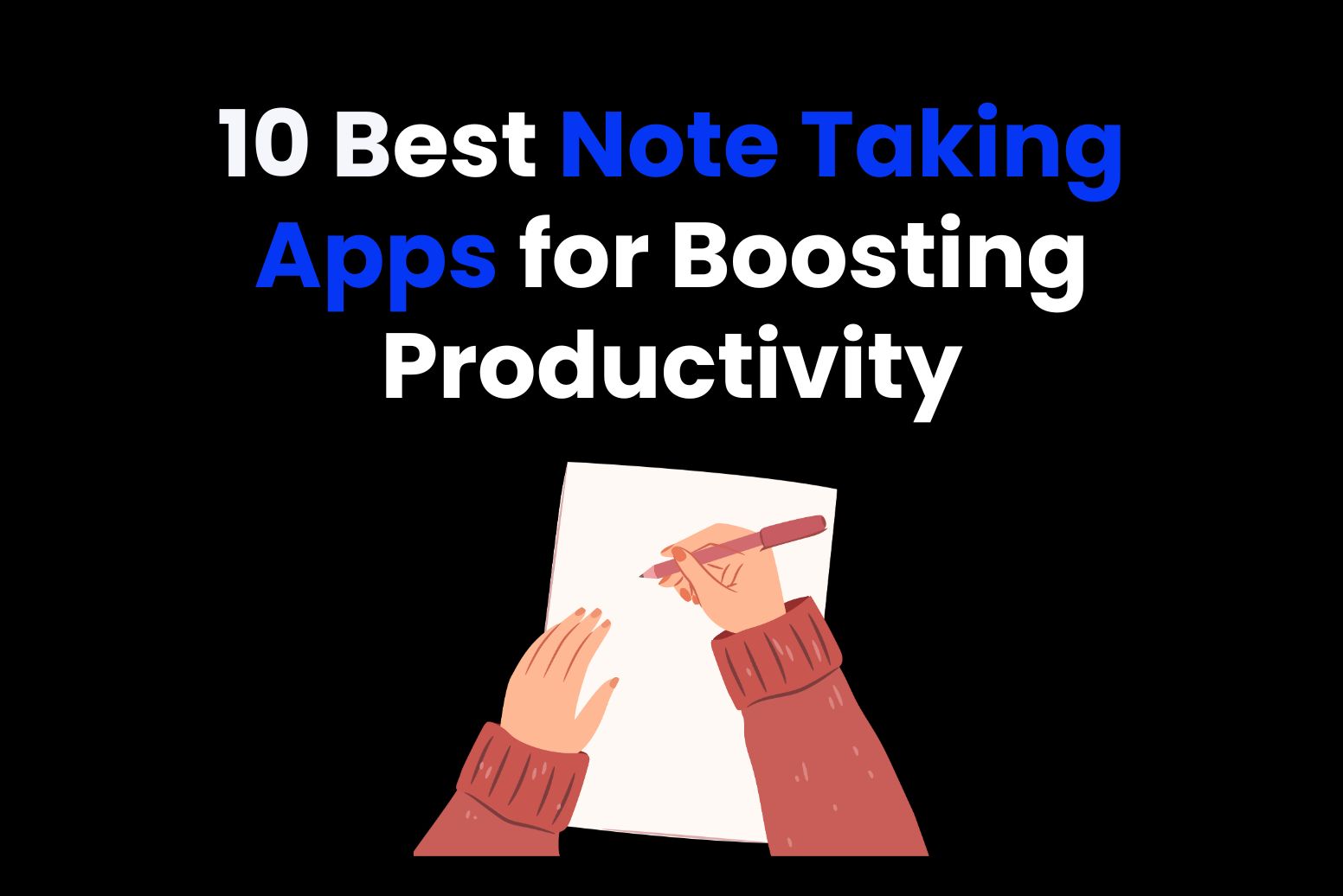AI has totally changed the way we do research, and in 2025, if you’re in need of research help, we have a true game-changer. Therefore, here are the best AI tools for research of 2025.
No more getting buried under heaps of data or endlessly searching through literature. Honestly, with the right AI tools, you can zip through your research, get way more done, and really dive into the exciting stuff—like making new discoveries!
Time to stop worrying and start checking out the top 5 AI tools for research that are transforming how things get done. These will make you work faster and become way more efficient.

How can AI be used as a tool for research?
AI is like having a super handy toolkit for your research. You know ChatGPT, right? Well, there’s a whole bunch of other cool AI tools out there too.
Here’s the thing: these AI tools are like your secret weapons. In addition, AI tools are like a super-powered magnifying glass for data. For that, they help you dig through tons of info, find patterns, and discover ideas you may never notice on your own. If you’re a student or a researcher, these tools are a true revolution.
What’s more, with AI, you can breeze through loads of info, catch trends, and understand tricky aspects of any research. This means you’ll make smarter choices and come up with fresh ideas.
And the best part? AI handles all the boring stuff, so you can focus on the interesting parts – like figuring out what it all means and coming up with awesome ideas. It makes your research super-fast, super accurate, and helps you get way better results.
But what’s the bottom line?
However, AI isn’t just a new fad that’s going on—it’s the real deal. With these tools, you can up your research game and find some seriously relevant information, fast. Ready to see which AI tools can boost your research game? Here are our top picks for 2025.
The 5 best AI tools for research
AI is totally changing the game for social and market research. Hence, there are some awesome tools out there that make it super easy to gather, analyze, and understand data.
These tools are helping researchers get a better feel for what consumers are into and how markets are moving. It’s pretty mind-blowing how AI is making things like these happen. But that’s where we are in 2025.
1. Arvin AI
Arvin AI is a super handy Chrome extension that uses GPT-4 to make research a breeze. It’s all about boosting your productivity by bringing together a bunch of AI tools right in your browser.
Basically, instead of messing around with different sites and getting overwhelmed, Arvin AI does the heavy lifting for you. It makes complicated research and content creation way simpler and quicker. So, you can get your work done faster and with less hassle.
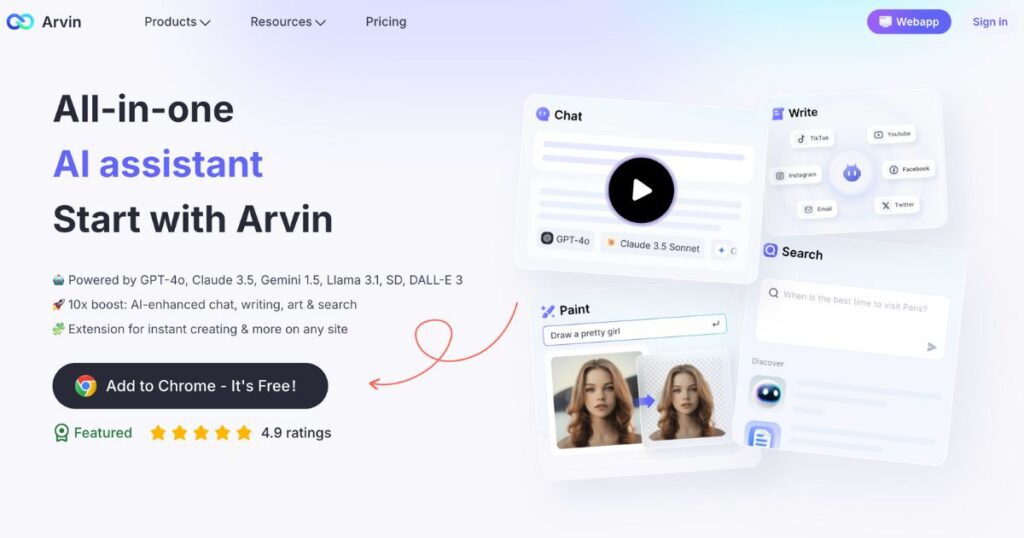
Best for:
This AI tool is just what you need if you’re a researcher, student, or pro juggling loads of data, analyzing info, or cranking out top-notch content quickly. To put it simply, whether you’re summarizing articles, translating documents, or digging up research insights, Arvin AI’s got your back.
In other words, it’s all about making your life easier. With its amazing set of tools, you’ll blaze through your tasks much more smoothly. As an example, if you’re dealing with a lot of data, hunting for key details, or putting together reports, Arvin AI helps you get any research done quickly and efficiently.
Pros:
- Versatile functionality: Arvin AI excels in a range of tasks including content generation, summarization, and data analysis.
- Advanced ai integration: With GPT-4, this tool can get precise and contextually relevant results.
- User-friendly: The browser extension and web app are both intuitive and easy to navigate.
- Cost-effective plans: Arvin gives you a totally free version with daily credits and affordable subscription plans.
Cons:
- Limited free credits: The free version includes 30 daily credits, which might not be sufficient for extensive research tasks.
- Browser-dependent: Primarily designed as a Chrome extension, which may not suit users preferring other browsers.
Features list:
- Ai-powered summarization: Arvin can condense articles in a flash, and also, web pages, and PDFs.
- Content creation: It can give you high-quality blogs, emails, and other written content.
- Code interpreter: Analyze and process data efficiently.
- Image generation: Create custom visuals and AI-generated art.
- Multi-language translation: Break down language barriers with ease.
- Customizable templates: Tailor email templates and other documents to your needs.
Compatibility:
Arvin AI started as a Chrome extension but now also offers a fully functional web application, ensuring compatibility across various platforms and devices.
Also, this integration simplifies your workflow, allowing you to access its features from anywhere.
Price:
Arvin AI provides a flexible pricing structure to accommodate various needs. And you can start with a free trial, which includes 30 daily credits—ideal for exploring its features and assessing how well it fits your research tasks. What’s more, for those seeking more extensive use, Arvin AI offers three subscription plans:
- Lite plan: $9.99 per month, designed for occasional users.
- Plus plan: $19.99 per month, suited for regular use with additional features.
- Unlimited plan: $39.99 per month, catering to heavy users with unrestricted access.
2. ChatGPT
ChatGPT is a very smart AI chat system made by OpenAI. Before, (and with the free plan), it uses GPT-3.5, but now if you pay, you get the even better GPT-4.
So, it’s basically designed to handle all kinds of language tasks. Whether you’re trying to whip up some text, need something translated, or want a deep dive into just about anything, ChatGPT’s got you covered.
Simply put, it’s like having a really sharp assistant who can do everything from writing to answering your questions. And with GPT-4, it’s even more on point.
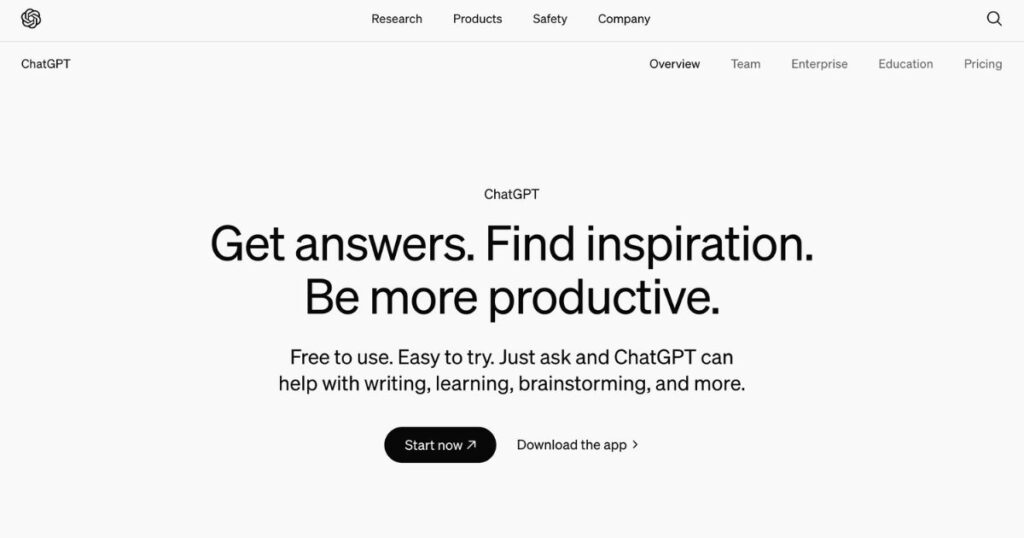
Best for:
Alright, in case you need an AI tool to up your game in communication, content creation, or info gathering, ChatGPT is your go-to. Moreover, it’s perfect for everyone—from writers and researchers to businesses—who need a smart, reliable language assistant.
And no matter if you’re creating content, doing some research, or just need some help with communication, ChatGPT makes everything easier and faster.
Pros:
- Advanced language capabilities: It uses GPT-4 for more complex and accurate responses compared to earlier models.
- Flexible use: ChatGPT can handle a huge range of language tasks, including text generation, translation, and summarization.
- Regular updates: This AI is in constant evolution with new features and improvements.
- Free and paid options: And it offers both a free version and advanced paid plans to suit different needs.
Cons:
- Free version limitations: Sadly, the free plan uses GPT-3.5, which has fewer features compared to GPT-4 (which is limited in the free version).
- Premium cost: Instead, the paid options, especially for teams, might be a bit pricey for some users.
Features List:
- Text generation: Create high-quality content for articles, blogs, and more with advanced AI.
- Language translation: Translate text between multiple languages with ease.
- Detailed explanations: Get comprehensive explanations on a wide range of topics.
- Image creation (upcoming): Future updates are expected to include image generation capabilities.
- Real-time updates: It can access to the latest information and improvements in AI technology.
Compatibility:
ChatGPT is compatible with most devices and platforms… such as your web browsers, your smartphones, and with programming languages.
Price:
The thing is that ChatGPT provides several pricing options to suit different budgets:
- Free plan: Includes access to GPT-3.5, offering basic functionality for casual users.
- Plus plan: So, this is the best for your buck, since you only pay $20 per month. With that, this plan upgrades you to GPT-4, providing enhanced features and capabilities.
- Team plan: $25 per user /month billed annually or $30 per user /month billed monthly.
3. ChatPDF
ChatPDF is an advanced AI-driven platform designed to revolutionize how you interact with PDF documents.
Utilizing the latest ChatGPT technology, this tool allows you to swiftly extract and understand key information from any PDF, whether it’s a short flyer, a detailed presentation, or a comprehensive book.
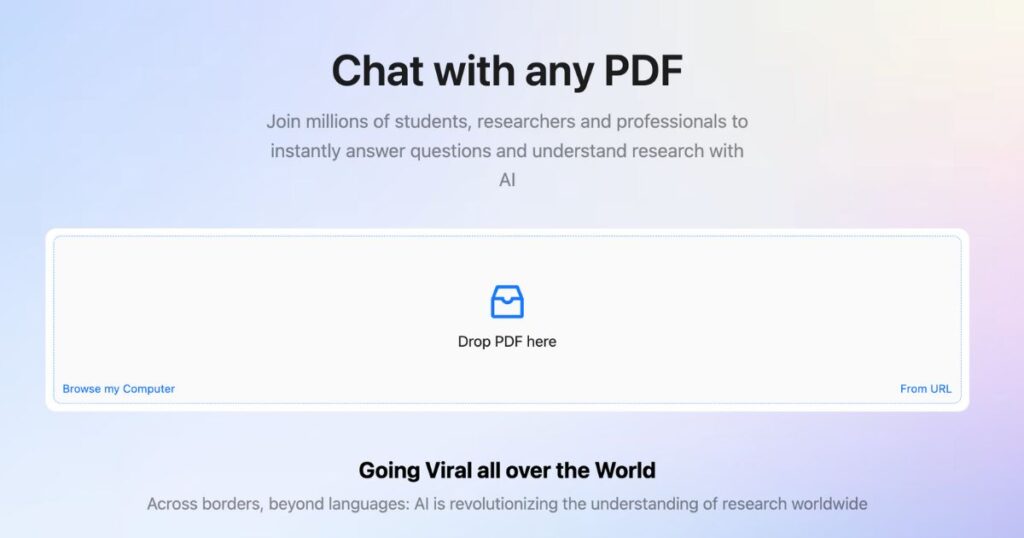
Best for:
ChatPDF is ideal for individuals who frequently work with PDF documents and need to quickly grasp important details. Also, it’s perfect for students, researchers, and professionals who handle extensive reports or academic papers and require efficient summarization and analysis.
Pros:
- Time-efficient summaries: Quickly generate concise summaries from lengthy PDFs.
- Interactive Q&A: Engage directly with the document to receive specific answers.
- Multi-language translation: Summarize and translate documents in various languages.
- Versatile document handling: Suitable for a broad range of document types and sizes.
Cons:
- Image analysis limitation: The tool currently does not interpret content within images.
- Free version restrictions: The free version has limitations that might not meet the needs of frequent users.
Features list:
- Automatic summarization: Condenses lengthy PDFs into clear and concise summaries, highlighting key information.
- Interactive Q&A: Allows you to ask targeted questions about specific content or details in the PDF and get accurate responses.
- Multi-language support: Enables translation and summarization of documents in multiple languages, improving accessibility.
- Complex document analysis: Capable of analyzing detailed reports and proposals, providing essential data efficiently.
Compatibility:
ChatPDF is accessible both as a web app and a browser extension, making it compatible with various devices and platforms. And this ensures that you can utilize its features wherever you need to work with PDFs.
Price:
The good this is this AI tool has two pricing options to fit different types of users.
- Free version: This one gives you the possibility to work with PDFs up to 120 pages, with a file size limit of 10 MB. And you can process up to 3 documents per day and ask up to 50 document chat questions daily.
- Premium version: Supports PDFs up to 2,000 pages, with a file size limit of 32 MB. This plan includes the ability to process up to 50 documents per day and handle up to 1,000 document chat questions daily.
4. Research Rabbit
Research Rabbit is a total game-changer for tracking down academic journal articles. Imagine it as the “Data base of academic research”—it makes it super easy to dig into specific subjects or authors. So, you just jump in and start exploring.
What’s awesome is that it connects related articles, so you get a complete view of whatever topic you’re looking into. Basically, it helps you build out your research and spot connections you might not have noticed before.
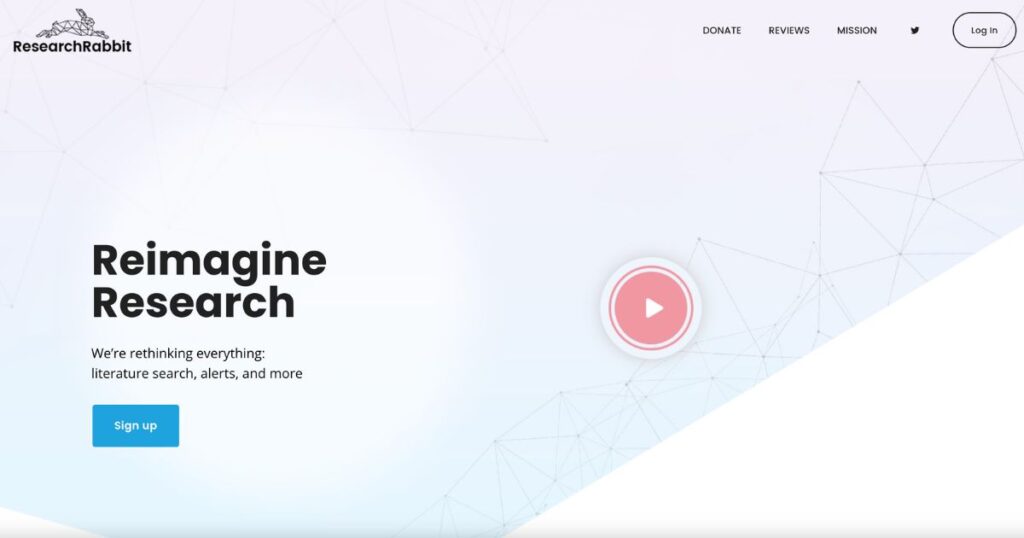
Best for:
The thing with this AI app is that is great for students, researchers, academics, and anyone else who needs to dive deep into literature reviews. What’s more, if you want to make your research easier, this tool is perfect for finding the right articles fast and putting together your collection.
Pros:
- Efficient search engine: Quickly find articles related to your initial search, including those cited within and citing the selected article.
- Article collections: Easily create and save collections of articles on specific topics, making it simple to organize and reference your research.
- Integration with Zotero: Sync your Research Rabbit collections with Zotero, ensuring that your bibliographic data is always up to date across platforms.
- Free to use: Enjoy all the features without any cost, making it accessible to everyone.
Cons:
- Limited to academic articles: While powerful for academic research, it may not be suitable for general information or non-academic content.
- No premium features: The tool is entirely free, but users looking for advanced, premium features might find it lacking.
Features list:
- Advanced article search: Search for academic articles by subject, title, or author.
- Related article discovery: Find articles related to your search, including those cited in and citing the original article.
- Article collection management: Save and organize articles into collections for easy reference.
- Zotero synchronization: Seamlessly sync your collections with Zotero for integrated research management.
- Unlimited storage: Save as many articles as you need without any restrictions.
Compatibility:
Research Rabbit works on any device with Internet. So, you can get to your research whenever and wherever you want.
Price:
The best part? It’s totally free—no extra charges or hidden fees. Plus, it’s supported by donations, so you have the option to help out if you want. Essentially, you get all the features at no cost, and if you’re up for it, you can pitch in to support it.
5. Consensus
Consensus is a super handy AI search engine that makes finding info in research articles a breeze. Think of it as a special search tool just for researchers—kind of like Google, but focused on academic and scientific stuff.
Moreover, here’s the deal: Consensus uses advanced tech to sift through loads of research papers and delivers the exact info you need. Basically, it’s like having a research assistant who quickly finds the right details for you.
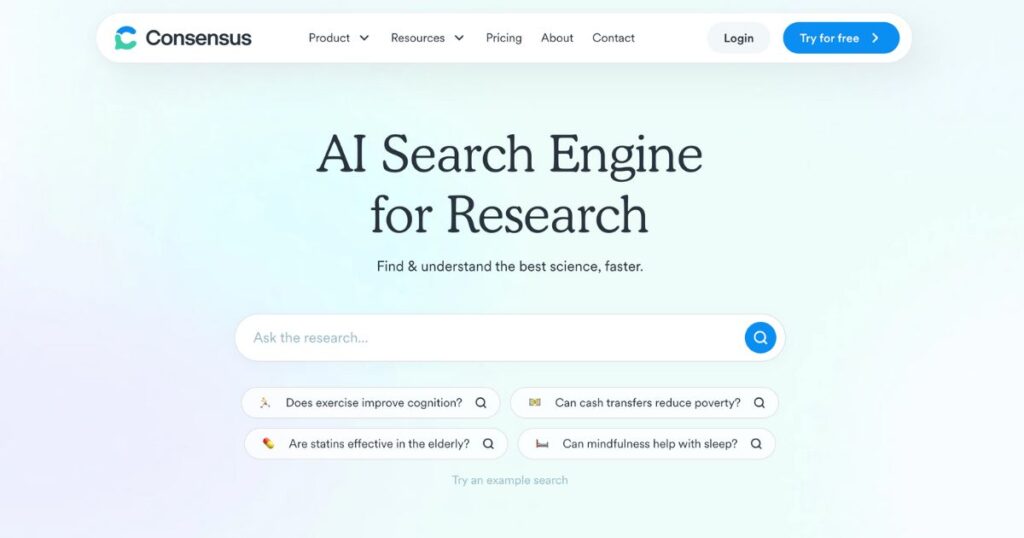
Best for:
This tool is great for researchers, academics, and students who need to quickly find and summarize info from lots of research articles. It’s also perfect for doing lit reviews or keeping up with the latest in your field.
In short, if you want something that helps you get to the important stuff fast and easy, this is it. It’s perfect for staying updated without getting overwhelmed.
Pros:
- Efficient search results: Quickly finds and ranks relevant research articles based on their relevance to your query.
- Customizable lists: It can actually save a lot of results in pre-defined or custom lists for easy access and organization.
- Integration: This AI integrates with Zotero and, soon, with Mendeley, Paperpile, and EndNote.
- GPT-4 summaries: Consensus gives you concise, AI-generated summaries of key information from articles.
- Personalized filters: Utilize filters to refine search results according to your specific needs.
Cons:
- Limited integration: While it supports Zotero, full integration with other reference managers like Mendeley and EndNote is still in development.
- Premium features: Some advanced functionalities are only available in paid plans.
Features list:
- Consensus meter: Ranks articles based on their relevance and how well they address your research question (analyzes up to 20 articles).
- GPT-4 scientific summaries: Offers brief, AI-generated summaries of the most pertinent information from research papers.
- Custom lists: Create and manage lists of saved articles with personalized titles.
- Advanced search filters: Tailor your search results using various filters for a more focused research experience.
- Plugin integration: Includes a plugin for GPT-4 to enhance search and summary capabilities.
Compatibility:
Consensus is designed to work seamlessly with several popular reference management tools. Currently, it integrates smoothly with Zotero, allowing for efficient import and organization of research materials.
What’s more, future updates will expand compatibility to include Mendeley, Paperpile, and EndNote, broadening the range of reference management systems that can be used in conjunction with Consensus. And this makes it easier for users to incorporate Consensus into their existing research workflows.
Price:
- Free: Basic access with fundamental features at no cost.
- Premium: $8.99 per month for additional functionalities and advanced features.
- Teams: $9.99 per seat per month, suitable for collaborative research teams.
- Enterprise: Custom pricing for large organizations requiring bespoke solutions and extended capabilities.
Comparing the best AI tools for research
Here’s a quick rundown of how the last 5 AI tools for research stack up:
| AI Tool | Arvin | ChatGPT | ChatPDF | Research Rabbit | Consensus |
| Compatibility | Chrome extensionWeb App | Chrome, Firefox, Safari, and Edge iOS and AndroidPython and JavaScript | Web appBrowser extension | Web-based plataform | Consensus works well with Zotero now and will soon support Mendeley, Paperpile, and EndNote. |
| Price | Free version: Get 30 daily credits for a range of services.Paid plans: Starting at just $9.99 per month. | The free version comes with GPT-3 features. For GPT-4 access, paid plans start at $20 per month. | Free version: PDFs up to 120 pages, 10 MB, 3 docs/day, 50 chat questions/dayPremium version: PDFs up to 2,000 pages, 32 MB, 50 docs/day, 1,000 chat questions/day. | Free | Free version.Premium starts from $8,99/m. |
| User Friendliness | Yes | Yes | Yes | Yes | It might get difficult for some users. |
| Research Capability | Chrome extension that uses GPT-4. It’s very efficient for research. | With the free plan it can be limited. | Efficient to go through PDF documents. | It’s a very complete free option. | It’s best to dig into large amounts of content. |
Tips for Using AI Tools in Research
So, these days, AI is like a real ace under the sleeve for researchers and academics. Trust us, it’s like having a super-smart sidekick who can help you brainstorm ideas or crunch numbers. But you have to remember, it’s all about using it wisely. Don’t try to do more work, but to work smarter.
Anyway, here’s the lowdown on using AI for your research:
- Define your research goals: Before you go all in on AI, let’s get clear on what you’re trying to do. What are your goals? What questions do you want answered? This will help you choose the right tools and make sure they’re actually useful.
- Choose the right tools: AI tools are like a giant toolbox, just like we talked about earlier. What they can do for you is help with almost everything you need. For example, from analyzing data to reviewing research papers and even writing. So, take some time to explore the options and find the ones that are perfect for your specific needs.
- Ethical considerations: Be aware of any biases or misinformation that some AI tools might have. To this, choose the right tools that won’t mess up your research.
- Human judgment is key: Finally, remember that AI is a great helper, but it’s not a replacement for your own thinking. Instead, use it to boost your research, but trust your own judgment.
Final Words
When it comes to conducting research, you’ll encounter numerous tools designed to help you streamline the process. We hope this list of the best AI tools for research in 2025 was helpful!
However, one tool that truly stands out, and it is Arvin AI. We see it as a research assistant ready to boos productivity like no other. It helps with academic studies, market analysis or complex data like no other!
One of Arvin key strengths lies in its extensive database of research templates. With access to over a thousand tailored templates and more than 200 new ones added regularly, you’ll never run out of inspiration. Sometimes, all you need is a bit of inspiration for an amazing research project. That’s exactly where these tools shine.
Hold on, as there is even more! With Arvin, you’ll get a summarization tool which will get you insight on your research in a minute. Get notes, ideas or drafts in a minute so that your research is easier than ever. We consider it a true research assistant that truly comes in handy while doing hard work.
Since you’ve got 30 free credits, why not give Arvin a go?
FAQs
Looking for the right AI tool for your research? Well, the best pick really comes down to what you actually need and how much you can pay. But no worries—just think about these things:
1. What’s the AI going do for you? Figure out its main job.
2. How much can you spend? Set your budget.
3. How good are you with tech? Be real about your tech skills.
4. What features are a must? List what you really need.
Keep this in mind, and you’ll find the right tool for you!
Absolutely! But think of AI as a tool, not a replacement for your own brainpower. It can really help with:
1. Generating ideas and brainstorming
2. Summarizing existing research
3. Providing feedback on your writing
4. Creating outlines and structures
Are you trying to find the perfect AI tool for your schoolwork? Honestly, it can be a pain with so many choices out there. But don’t stress—we’ve got you. Arvin is perfect for when it comes to writing essays, research papers and anything else for school. In addition to helping with brainstorming, it can also fix up your writing.
Yes, ChatGPT can be a total lifesaver for research! In addition to helping with find anything you need, brainstorm ideas, and summarize articles.
But here’s the catch: always double-check the information you get from it. Especially if you’re doing something super important or specific, because ChatGPT might not have the latest or most complete info.
Of course, universities can totally catch you if you used GPT or other AI tools in your work. Even if those AI detectors aren’t perfect, they can still spot patterns and styles that are totally AI-generated. So, it’s important to use AI ethically and responsibly, and to give credit where credit is due.

